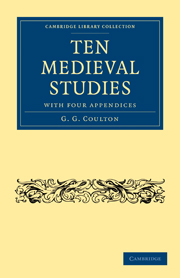Book contents
- Frontmatter
- PREFACE TO FIRST EDITION (1906)
- PREFACE TO SECOND EDITION (1915)
- PREFACE TO THIRD EDITION
- Contents
- I The Monastic Legend
- II A Revivalist of Six Centuries Ago
- III Side-Lights on the Franciscans
- IV The High Ancestry of Puritanism
- V Romanism and Morals
- VI The Truth about the Monasteries
- VII Religious Education before the Reformation
- VIII Priests and People before the Reformation
- IX The Failure of the Friars
- XIII The Plain Man's Religion in the Middle Ages
- Appendices
- Index
PREFACE TO SECOND EDITION (1915)
Published online by Cambridge University Press: 07 September 2010
- Frontmatter
- PREFACE TO FIRST EDITION (1906)
- PREFACE TO SECOND EDITION (1915)
- PREFACE TO THIRD EDITION
- Contents
- I The Monastic Legend
- II A Revivalist of Six Centuries Ago
- III Side-Lights on the Franciscans
- IV The High Ancestry of Puritanism
- V Romanism and Morals
- VI The Truth about the Monasteries
- VII Religious Education before the Reformation
- VIII Priests and People before the Reformation
- IX The Failure of the Friars
- XIII The Plain Man's Religion in the Middle Ages
- Appendices
- Index
Summary
These papers, though occasional and to a great extent controversial, have one general purpose in view—to justify the main trend of modern culture. Strongly as the author sympathizes with the triumph of medieval over classical civilization, he is equally convinced of the necessity of outgrowing the Middle Ages. St Augustine had to combat a formidable reactionary party which attributed all the evils of the fifth century to Rome's abandonment of her old gods; we, in the twentieth century, have still to combat a similar reaction towards institutions which have lost the universal obedience which they once commanded. Whatever may be our attempts to solve the riddle of the universe, whether in the religious or in the secularist sense, much must depend upon the appeal to history. To a great extent, our theory of life and our hopes for the future must be based upon the facts of the past; and any falsification of those facts must therefore, in the long run, impede true social progress. Opinions will always differ widely and legitimately; but many facts of history might be established with practical certainty, if only we were willing to take a little more trouble. The difference between a Roman Catholic, a Protestant, and an agnostic is often even more philosophical than historical. And those differences could be far more tolerantly discussed if only all parties could agree more nearly on matters of ascertainable fact: the widest dividing gulf is the suspicion, on one side or the other, of careless mis-statements, or even of literary dishonesty.
- Type
- Chapter
- Information
- Ten Medieval Studieswith Four Appendices, pp. vii - xiiPublisher: Cambridge University PressPrint publication year: 2010First published in: 1930



